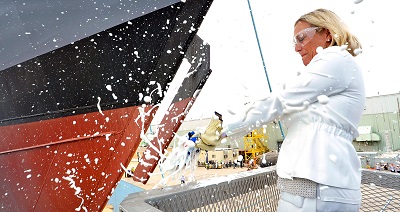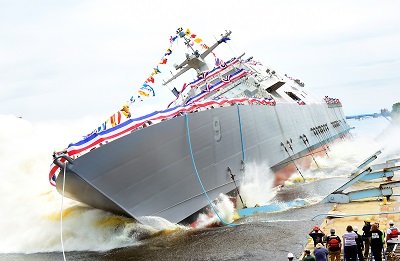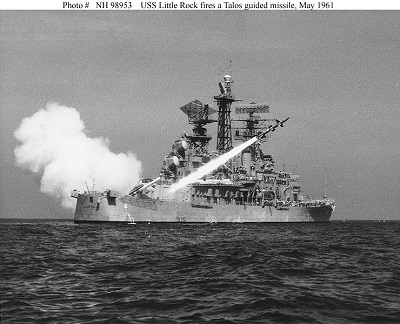[Watch] USS Little Rock (LCS 9) Launched
On Saturday July 18, the future USS Little Rock got one step closer to patrolling the world’s shorelines and open seas when it was launched Marinette Marine Corporation shipyard.
 The ship’s sponsor, Janee Bonner, christened Little Rock (LCS 9) with the traditional smashing of a champagne bottle across the ship's bow just prior to the launch.
The ship’s sponsor, Janee Bonner, christened Little Rock (LCS 9) with the traditional smashing of a champagne bottle across the ship's bow just prior to the launch.
“It is such an honor and a privilege to serve as the sponsor of the future USS Little Rock and to be a part of this major milestone along the way to her assuming her place as part of the great U.S. Navy fleet,” Bonner said.
Following christening and launch, Little Rock will continue to undergo outfitting and testing before delivery to the Navy later this year.
“This future USS Little Rock will use interchangeable mission modules that empower her to face a variety of high-priority missions, from Anti-Surface Warfare to Anti-Submarine Warfare to Mine Countermeasures,” said Vice President of Littoral Ships & Systems, Joe North. “She is ideally suited to navigate the reefs and shallows in the Asia-Pacific, as so well demonstrated by USS Fort Worth on her current deployment.”
The Little Rock is one of seven littoral combat ships under construction at Marinette Marine.
The Lockheed Martin-led industry team is building the Freedom variant, and has already delivered two ships to the U.S. Navy. USS Freedom (LCS 1) successfully deployed to Southeast Asia in 2013 and is currently operating out of her homeport in San Diego, California. USS Fort Worth (LCS 3) is currently deployed in Southeast Asia, serving in the U.S. 7th Fleet to strengthen international relationships, engage in multi-regional naval exercises and further LCS capabilities using manned and unmanned assets.
Milwaukee (LCS 5) was christened and launched in 2013, and is slated to be delivered to the Navy this fall. Detroit (LCS 7) was launched in 2014. Sioux City (LCS 11) is in construction, and Wichita (LCS 13) had its keel laid in February 2015. Billings (LCS 15), Indianapolis (LCS 17) and St. Louis (LCS 19) are in the construction phase.
 USS Little Rock will be the first of an eventual eight Freedom-class Littoral Combat ships to be homeported in Mayport, Florida.
USS Little Rock will be the first of an eventual eight Freedom-class Littoral Combat ships to be homeported in Mayport, Florida.
Manned by a crew of fewer than 100 sailors operating under a concept known as the “3-2-1 plan”, the Navy will rotate three crews for every two ships, keeping one of those ships underway at all times. The LCS will have a core crew of about 50 sailors, then a specialized crew for each type of mission.
The Littoral Combat Ship is the model of modularity. The Little Rock will be a launch pad for aircraft (manned and unmanned) and unmanned surface and underwater vehicles.
Depending on its mission package (which requires only a 3-day turnaround), the ship can conduct anti-submarine, anti-surface warfare or mine countermeasures missions. The Little Rock has a built-in capacity for growth, with sensor packages and equipment designed using open architecture and already linked to a vast network across the US Navy fleet.
Freedom-class ships are 378.5 feet long with a 57.4-foot beam and have 3,000 metric tons displacement (with a full load). Draft is 12.8 feet and top speed exceeds 40 knots.
Little Rock will be the fifth in the fleet of the odd-numbered Freedom variant, featuring a steel double-chine advanced semi-planing monohull design. The even-numbered LCSs are of the Independence-variant featuring stabilized slender monohulls of aluminum.
Smaller than a frigate, the LCS is an agile force multiplier in gaining and sustaining maritime supremacy while conducting operations consisting of freedom of navigation, theater and maritime security, maritime law enforcement, counter-piracy, humanitarian assistance, disaster relief, search and rescue and maritime domain patrols.
The Original Little Rock
Little Rock (LCS 9) is the second Navy vessel named after the capital city in Arkansas. Upon its champagne-splashed hull, the littoral combat ship will continue the proud heritage of the original USS Little Rock (CL 92), which is now a museum ship at the Buffalo and Erie County Naval and Military Park, Buffalo, N.Y.
The first Little Rock featured three different hull numbers and designations during its 31-year career.
 USS Little Rock (CL 92) was originally in service from 1945-1949. That first four year tour of duty included training and exercises off Cuba and transiting the Panama Canal. Later, it sailed in the Mediterranean 1947-1948 and was then decommissioned in 1949 to join the Atlantic Reserve Fleet at New York.
USS Little Rock (CL 92) was originally in service from 1945-1949. That first four year tour of duty included training and exercises off Cuba and transiting the Panama Canal. Later, it sailed in the Mediterranean 1947-1948 and was then decommissioned in 1949 to join the Atlantic Reserve Fleet at New York.
After a three-year conversion to a guided-missile cruiser, USS Little Rock (CLG 4) was recommissioned in 1960. During November 1961, Little Rock was ordered to the waters off Santo Domingo to provide stability during a period of unrest following the assassination of President Rafael Trujillo. The ship also sailed annually to the Mediterranean as it maintained peace in southern Europe and the Middle East.
Little Rock was the Sixth Fleet flagship during the Arab-Israeli Six-Day War June 5-10, 1967. The cruiser provided assistance to USS Liberty (AGTR 5) after the ship was mistaken for an Egyptian vessel and attacked by Israeli Air Force fighter aircraft and Israeli Navy motor torpedo boats June 8. The attack, which severely damaged the ship, killed 34 crew members and wounded 171.
While steaming in the Mediterranean with the USS John F. Kennedy (CVA 67) task group, a young ensign named Ray Mabus, now the Secretary of the Navy, served as a surface warfare officer aboard the cruiser from 1970-72.
Mabus presented the keynote address at the christening of the new USS Little Rock (LCS 9).
On June 5, 1975, USS Little Rock represented the United States during the ceremony at Port Said, Egypt, for the reopening of the Suez Canal which had been closed since the June 1967 Six-Day War. It was the only foreign warship in the official flotilla that sailed down the canal to Ismailia for the occasion.
In 1975, Little Rock’s designation was changed from CLG-4 to CG-4. The cruiser and other ships of the Sixth Fleet provided protection and assistance during the June-July 1976 evacuations of non-Lebanese citizens of Beirut, Lebanon.

that matters most
Get the latest maritime news delivered to your inbox daily.
Little Rock was decommissioned at the Philadelphia Navy Yard on Nov. 22, 1976, stricken from the Naval Register, only to be re-designated for the last time — as a museum ship, the only World War II cruiser on display in the United States and the sole survivor of the Cleveland class, according to the Historic Naval Ships Association.
On June 30, 1979, USS Little Rock opened to the public, along with Fletcher-class destroyer USS The Sullivans (DD 537) and Gato-class submarine USS Croaker (SS 246) at the Buffalo and Erie County Naval and Military Park, Buffalo, N.Y.
